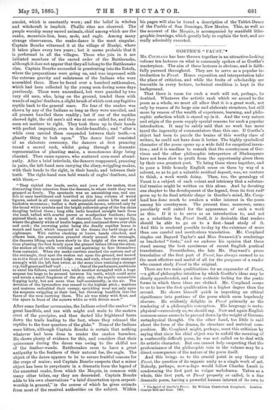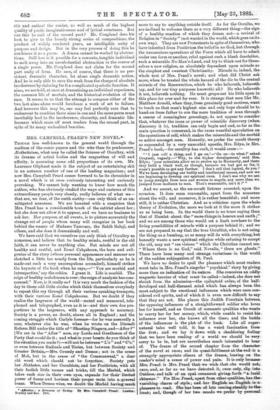GOETHE'S " FAUST."*
MR. COUPLIND has here thrown together in an attractive-looking volume ten lectures on what is commonly spoken of as Goethe's masterpiece. The aim of these lectures is obvious, and is faithfully pursued throughout. They are to serve as a popular introduction to Faust. Hence exposition and interpretation take the place of criticism, and while the fruits of scholarship are traceable in every lecture, technical erudition is kept in the background.
That there is room for such a work will not, perhaps, be doubted. Whatever the artistic rank which we accord to the poem as a whole, we must all allow that it is a great work, not only by reason of its large aim and elaborate structure, but still more by reason of the wealth of experience, learning, and philosophic reflection which is stored up in it. And the very nature and origin of the poem supply special reasons for such a popular introduction. It may be safely said that no work has more taxed the ingenuity of commentators than this one. If Goethe's object had been to puzzle the brains of this worthy class of writers, he could not have done it better. The highly symbolical character of the poem opens up a wide field for exegetical invention ; and it is needless to remark that the countrymen of Gervinus and the other philosophic interpreters of Shakespeare have not been slow to profit from the opportunity given them by their own greatest poet. To bring these views together, and to pour a little homely English sense on them by way of a solvent, so as to get a valuable residual deposit, was, we venture to think, a work worth doing. Then, too, the genealogy of Faust is a subject of such extent and intricacy that a substantial treatise might be written on this alone. And by devoting one chapter to the development of the legend, from its first rude germ up to its final artistic shape in Goethe's mind, Mr. Coupland has done much to awaken a wider interest in the poem among his countrymen. The present time, moreover, seems peculiarly well suited for the appearance of such a work as this. If it is to serve as an introduction to, and not as a substitute for, Faust itself, it is desirable that readers should be able to go on to a first hand study of it. And this is rendered possible to-day by the existence of more than one careful and meritorious translation. Mr. Coupland singles out Bayard Taylor's and Miss Swanwick's renderings as bracketed " firsts," and we endorse his opinion that these stand among the best specimens of recent English poetical translations. Nevertheless, the late Mr. Hayward's prose translation of the first part of Faust, has always seemed to us the most effective and useful of all for the purposes of a reader who cannot study Faust in the original.
There are two main qualifications for an expounder of Faust, —a gift of philosophic intuition by which Goethe's ideas may be clearly apprehended, and a fine wethetic feeling for the poetic forms in which these ideas are clothed. Mr. Coupland seems to us to have the first qualification in a higher degree than the second. He shows himself quick in importing an ethical significance into portions of the poem which seem hopelessly obscure. He evidently delights in Faust primarily as the rendering of a philosophic conception. His language is metaphysical—excessively so, we should say. Now and again English common-sense seems to be pressed down by the weight of German metaphysical thought. On the other hand, too little is said about the form of the drama, its structure and metrical composition. Mr. Coupland might, perhaps, meet this criticism by saying that since his chief object was to unfold the meaning of a confessedly difficult poem, he was not called on to deal with its artistic character. But one cannot help suspecting that the predominance of the philosophic vein in the volume may be a direct consequence of the nature of the poem itself.
And this brings us to the crucial point in any theory of Faust, the question of its organic unity as a single work of art. Nobody, perhaps, now-a-days would follow Charles Lamb in condemning the first part as vulgar melodrama. Taken as a whole, this first part, or Faust properly so called, is a fine dramatic poem, having a powerful human interest of its own to
stir and enthral the reader, as well as much of the highest quality of poetic imaginativeness and of lyrical sweetness. But can this be said of the second part? Mr. Couple nd does his best to give to the loosely strung series of compositions, the product of widely sundered years, an intelligible unity of purpose and design. But in the very process of doing this he condemns it as a poem. A drama cannot be worked by abstractions. Still less is it possible for a concrete, tangible individual to melt away into an unsubstantial abstraction in the course of a single poem. Mr. Coupland does not claim for the second part unity of form. He sees, of course, that there is no persistent dramatic character, let alone single dramatic action. And he is only able to save the work from the charge of absolute incoherence by claiming for it a complicated symbolic function. It aims, we are told, at once at dramatising an individual experience, the common life of mortals, and the historical evolution of the race. It seems to us that the attempt to compass. either of the two last aims alone would foredoom a work of art to failure. And however this may be, one may feel perfectly sure that to endeavour to combine these .aims in one and the same poem must inevitably lead to the incoherence, obscurity, and dramatic lifelessness which scare off most readers from_the second part, in spite of its many undoubted beauties.



































 Previous page
Previous page